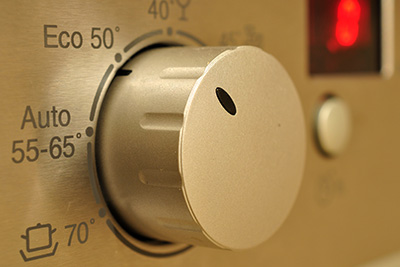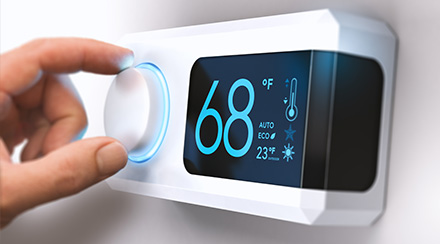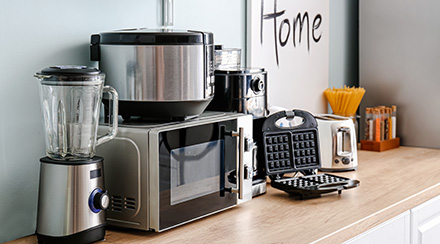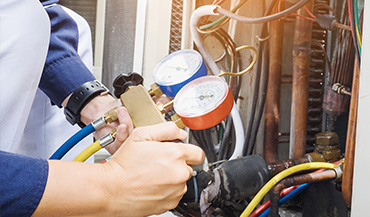How Much Electricity Does a Dishwasher Use?
If you’re looking for ways to reduce your household energy use, your attention will eventually turn to major kitchen appliances like your dishwasher. Many modern dishwashers feature intricate settings for different types of dishes and wash cycles, and these can make a big impact on the overall energy footprint of the appliance. But if you shop for new dishwashers carefully and use their settings wisely, you can minimize the energy costs of getting your dishes clean.
Dishwasher Wattage: Does a Dishwasher Use A Lot of Electricity?

As with most appliances, the electricity needs of dishwashers vary quite a bit based on their size, power and features. Compact, portable dishwashers may require only a few hundred watts, while the most powerful models can draw 2,500 watts or more. But dishwasher wattage is only one piece of the energy puzzle.
Dishwashers draw hot water from your water heater, and getting this second appliance involved can more than double the overall energy consumption of running a load of dishes. If you have an inefficient water heater, even an ENERGY STAR-certified dishwasher can cost you a lot of money on your energy bills.
Including a water heater in the equation makes the actual electricity use of a dishwasher harder to calculate, but it gets even more complicated than that. Some models allow you to set the length of the cycle, with longer cycles consuming more electricity. Dishwashers often have settings like “sanitize,” which uses extra hot water, and “delicate,” which uses lower water temperature. There may also be multiple drying settings, including air dry, fan dry and heat dry.
So, does a dishwasher use a lot of electricity? It depends on the dishwasher, it depends on the hot water heater, and it depends on the settings. Like we said – it’s complicated.
Check the EnergyGuide Label
While it can be tricky to figure out exactly how much electricity goes into washing your dishes, there is a cheat sheet that makes it easy to compare the efficiency of dishwashers. The federally required EnergyGuide label is available for all new dishwashers, and it can give you a basic idea of each model’s operating cost.
The EnergyGuide label is black and yellow and will state the estimated annual electricity use and estimated annual operating costs for use with both an electric water heater and natural gas water heater. This data is based on four loads of dishes per week and the national average rates for electricity and natural gas, so you can estimate whether your energy costs will be different based on your own dishwasher use and local energy rates.
Keep an eye out for the EnergyGuide label when shopping for a new dishwasher. If you’re shopping online and don’t see the EnergyGuide label at the point of purchase, try searching for the model number on the manufacturer’s website.
Another thing to look for when shopping for dishwashers is the ENERGY STAR logo. You’ll see this logo on dishwashers that meet the highest energy efficiency standards – less than 270 kilowatt-hours per year for standard dishwashers, and less than 3.5 gallons of water per cycle.
Energy-Efficient Dishwasher Tips

Buying an energy-efficient dishwasher is half the battle. The other half is keeping your actual energy consumption as low as possible by managing your dishwasher settings and keeping your appliances in good working order.
- Take care of your water heater. Standard tank water heaters should be replaced about every eight to 12 years, and tankless water heaters should be replaced after around 15 to 20 years. Water heaters should be inspected, flushed and maintained annually, and should be wrapped in an insulating jacket if installed in an unheated space.
- Clean your dishwasher regularly. In addition to keeping your dishwasher smelling pleasant, routine cleaning will help keep the jets and nozzles free of soap scum and other obstructions. This gives you a better wash, helping to ensure you only have to wash your dishes once.
- Use “eco” or “energy saver” settings if available. Many models have these settings to make it easier to keep the energy use to a minimum.
- Avoid added heat settings unless necessary. This includes heated dry cycles and “sanitize” cycles that increase the water temperature.
- Only wash full loads.
- Don’t overfill your dishwasher. Cramming the space increases the chance of dishes coming out dirty, requiring a second wash.
- Air-dry your dishes. Instead of using energy on heat or fan drying, open your dishwasher as soon as possible after the cycle ends to release the steam. It takes a little longer, but your dishes can dry overnight.
- Take advantage of variable electricity rates. If your electricity plan offers lower rates during off-peak hours, save your dishwasher loads until the price drops.
Looking for more ways to reduce your energy use? Read our article on energy-saving tips for more of our best methods to save energy in your home. For seasonal tips, check out our articles on weatherizing your home for summer and weatherizing your home for winter.
Looking for Something Specific?
Select a category to find resources for topics that interest you.
Select Category

Related Articles:

Tips for Improving Your AC and Furnace Efficiency
We share maintenance tips for your heater and AC, and home improvement tips to help you use those systems less.
Read Article
Tips for Saving on Energy in Your Home
If you’re looking to learn more about energy efficiency for home systems and appliances, we’re sharing our favorite energy-saving tips.
Read Article
What Uses the Most Electricity In a Home?
We break down what uses the most energy in your home to give you an understanding of where your energy usage goes and where energy-saving tactics can make the most impact.
Read ArticleMost Popular Articles

Keep Your HVAC Running Efficiently
Airtron's HVAC services can help keep your AC and heater running efficiently so you can stay comfortable while saving energy. Learn More.
How Much Electricity Does a Dishwasher Use?
If you’re looking for ways to reduce your household energy use, your attention will eventually turn to major kitchen appliances like your dishwasher. Many modern dishwashers feature intricate settings for different types of dishes and wash cycles, and these can make a big impact on the overall energy footprint of the appliance. But if you shop for new dishwashers carefully and use their settings wisely, you can minimize the energy costs of getting your dishes clean.
Dishwasher Wattage: Does a Dishwasher Use A Lot of Electricity?
As with most appliances, the electricity needs of dishwashers vary quite a bit based on their size, power and features. Compact, portable dishwashers may require only a few hundred watts, while the most powerful models can draw 2,500 watts or more. But dishwasher wattage is only one piece of the energy puzzle.
Dishwashers draw hot water from your water heater, and getting this second appliance involved can more than double the overall energy consumption of running a load of dishes. If you have an inefficient water heater, even an ENERGY STAR-certified dishwasher can cost you a lot of money on your energy bills.
Including a water heater in the equation makes the actual electricity use of a dishwasher harder to calculate, but it gets even more complicated than that. Some models allow you to set the length of the cycle, with longer cycles consuming more electricity. Dishwashers often have settings like “sanitize,” which uses extra hot water, and “delicate,” which uses lower water temperature. There may also be multiple drying settings, including air dry, fan dry and heat dry.
So, does a dishwasher use a lot of electricity? It depends on the dishwasher, it depends on the hot water heater, and it depends on the settings. Like we said – it’s complicated.
Check the EnergyGuide Label
While it can be tricky to figure out exactly how much electricity goes into washing your dishes, there is a cheat sheet that makes it easy to compare the efficiency of dishwashers. The federally required EnergyGuide label is available for all new dishwashers, and it can give you a basic idea of each model’s operating cost.
The EnergyGuide label is black and yellow and will state the estimated annual electricity use and estimated annual operating costs for use with both an electric water heater and natural gas water heater. This data is based on four loads of dishes per week and the national average rates for electricity and natural gas, so you can estimate whether your energy costs will be different based on your own dishwasher use and local energy rates.
Keep an eye out for the EnergyGuide label when shopping for a new dishwasher. If you’re shopping online and don’t see the EnergyGuide label at the point of purchase, try searching for the model number on the manufacturer’s website.
Another thing to look for when shopping for dishwashers is the ENERGY STAR logo. You’ll see this logo on dishwashers that meet the highest energy efficiency standards – less than 270 kilowatt-hours per year for standard dishwashers, and less than 3.5 gallons of water per cycle.
Energy-Efficient Dishwasher Tips
Buying an energy-efficient dishwasher is half the battle. The other half is keeping your actual energy consumption as low as possible by managing your dishwasher settings and keeping your appliances in good working order.
- Take care of your water heater. Standard tank water heaters should be replaced about every eight to 12 years, and tankless water heaters should be replaced after around 15 to 20 years. Water heaters should be inspected, flushed and maintained annually, and should be wrapped in an insulating jacket if installed in an unheated space.
- Clean your dishwasher regularly. In addition to keeping your dishwasher smelling pleasant, routine cleaning will help keep the jets and nozzles free of soap scum and other obstructions. This gives you a better wash, helping to ensure you only have to wash your dishes once.
- Use “eco” or “energy saver” settings if available. Many models have these settings to make it easier to keep the energy use to a minimum.
- Avoid added heat settings unless necessary. This includes heated dry cycles and “sanitize” cycles that increase the water temperature.
- Only wash full loads.
- Don’t overfill your dishwasher. Cramming the space increases the chance of dishes coming out dirty, requiring a second wash.
- Air-dry your dishes. Instead of using energy on heat or fan drying, open your dishwasher as soon as possible after the cycle ends to release the steam. It takes a little longer, but your dishes can dry overnight.
- Take advantage of variable electricity rates. If your electricity plan offers lower rates during off-peak hours, save your dishwasher loads until the price drops.
Looking for more ways to reduce your energy use? Read our article on energy-saving tips for more of our best methods to save energy in your home. For seasonal tips, check out our articles on weatherizing your home for summer and weatherizing your home for winter.
Looking for Something Specific?
Select a category to find resources for topics that interest you.
Select Category

Related Articles:

Tips for Improving Your AC and Furnace Efficiency
We share maintenance tips for your heater and AC, and home improvement tips to help you use those systems less.
Read Article
Tips for Saving on Energy in Your Home
If you’re looking to learn more about energy efficiency for home systems and appliances, we’re sharing our favorite energy-saving tips.
Read Article
What Uses the Most Electricity In a Home?
We break down what uses the most energy in your home to give you an understanding of where your energy usage goes and where energy-saving tactics can make the most impact.
Read ArticleMost Popular Articles

Keep Your HVAC Running Efficiently
Airtron's HVAC services can help keep your AC and heater running efficiently so you can stay comfortable while saving energy. Learn More.







